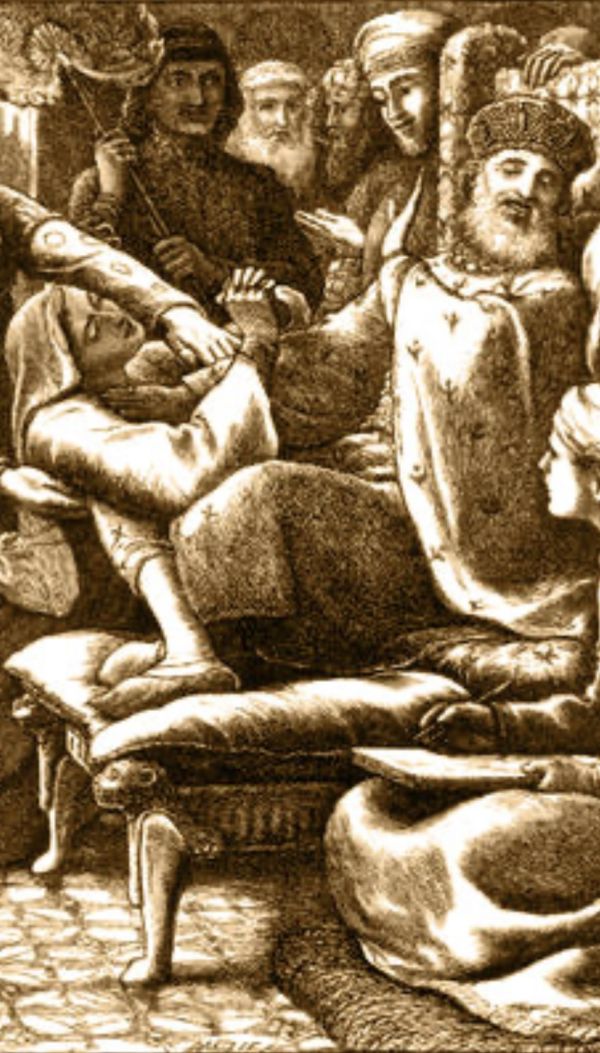The scandal of waiting
(Lk 18:1-8)
In the 80s the communities of Asia Minor suffered persecution because the emperor of Rome [the star Domitian] wanted to be venerated as god.
The official religious institution - servile and flattering - adapts itself. Christians not - aware of their own dignity and project of an alternative world.
Lk intends to encourage faithful and communities victims of abuse by highlighting how to reach the most effective disposition, capable of undermining the blackmail of social estrangement underway.
The ‘silence of God’ over abuses and domination of bullies posed questions and raised reserves of faith.
But in the parable, the irresponsible judge is not the Father! The unjust is icon that dramatizes the condition in which the disciples (without Master) come to be found in a world of cunning people.
Here is the «widow»: the community of the new ‘Anawim, poor of Yahweh [in the Gospels «ptōchôis»] ie defenseless, exposed to abuse - who have the Lord as their only hope.
They don’t remain on the surface of situations. They perceive the signs of the new Kingdom - of an alternative humanity - and crave them.
Lk says: the only means of finding oneself and not losing one’s founding energy is Prayer. It is not a folding in on oneself (vv.3.7).
The prayer of the sons is rather a forward action. A sort of leap that becomes magnetic and finally takes possession with force of his deep desire.
An embezzlement. As St. Bernard said: «How much I miss, I usurp from the side of Christ».
In short, Christian prayer has the same step of the Faith, and its multifaceted sides.
So it doesn’t plant us on the spot: it becomes a Source that induces rash gestures.
Why? At certain times things change. In the "world", only by calculation - but that said, even the most banal interests move something (vv.4-5).
There are aspects of our Dialogue with God characterized by traits of assent. But the “colourful” part of prayer comes when one enters the spousal climate - of listening, intuition; also of struggle and personal quarrel.
They result in a sort of reading of one’s own story’s weight, of the time’s genius and the grips for an actualization, which brings us out of mediocrity: take it or leave.
In short, prayer is a concrete gesture. It puts us in touch with a ‘vision’ that gives indications. Vocation at all costs.
A sort of primordial energy that comes back to heal and direct situations.
Not only is it the great tool for not losing head, and a means not to discourage.
Rather, a pungent and annoying action, with an attractive effect - as a ‘magnet’.
The dynamic, not very reassuring nest of prayer, brings us back to the Core of essence, to the eminent Self; to the realm of the Call by Name.
It becomes Reading and Intuition that meets the deep states.
It’s in shift of gaze and Vision that we actualize the future.
In this way, prayer itself guides us to the realization of our individual and ministerial-ecclesial being.
In fact, it creates: suddenly places (v.8) the appropriate conditions, the acute moments of the turning - because it lives Elsewhere, and in the base of the soul.
It sees God in the furrows of history, therefore it activates the energies of becoming: it drags reality, attracts it.
It enshrines and actualizes what is ‘coming’; it questions and stirs up the institution that tends to wither.
With his Rudder, even among too many mists, it plows through the waves of ageing toxins, flies over the harassment; moves the world and our whole life.
[Saturday 32nd wk. in O.T. November 16, 2024]












